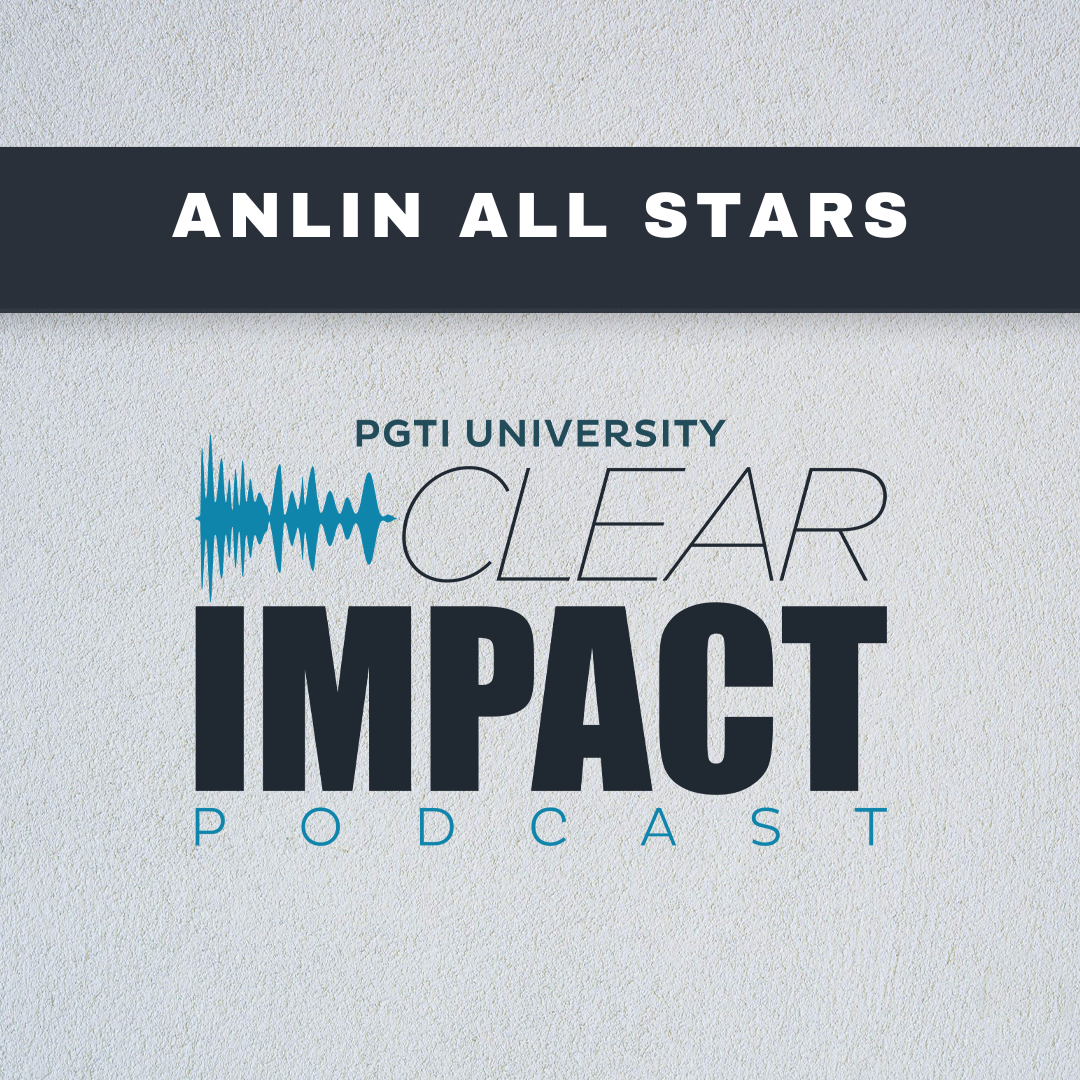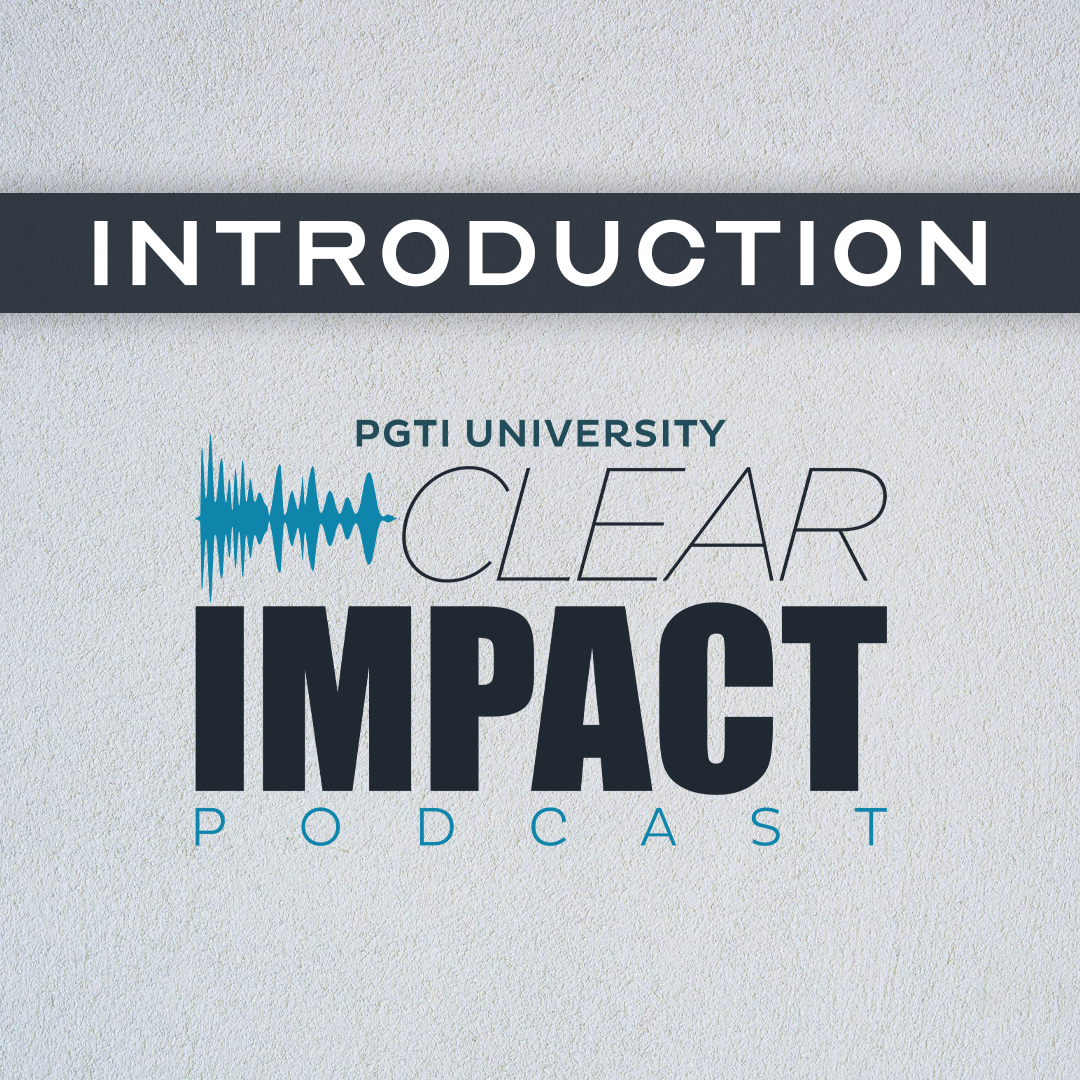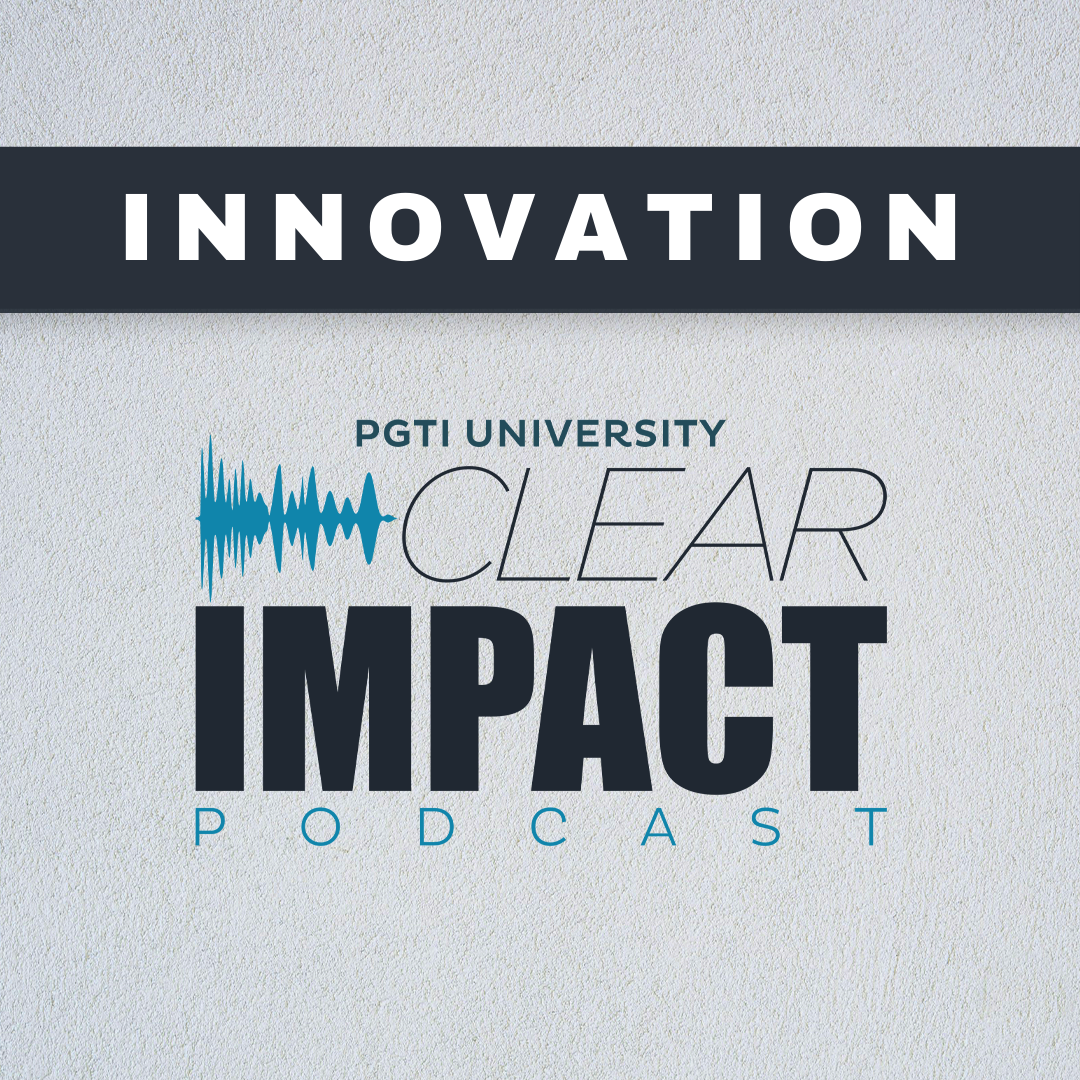Speaker 1 00:00:05 Welcome to the clear impact podcast brought to you by PGT university. Thanks for joining us today. My name is Sherry Conner, and I am your host
Speaker 2 00:00:20 Getting an understanding of what is meaningful to the people in your organization. So whether it's, uh, a children initiative, whether it's animal rescue and pets, whether it's the elderly, there's so many opportunities to help the community, whether it's, you know, food drives, um, you know, especially with what's been going on in, in our society today,
Speaker 1 00:00:40 Running a successful business, doesn't happen in a vacuum today on the clear impact podcast. We talk with Debbie Lapinski, our chief human resource officer, and we discuss the benefits of having a community mindset. Debbie shares with us ways that PGT has given back and how those actions made a lasting impact on our company and our employees. We also share some practical ideas on how business owners can align their purpose to help others in a meaningful way. Good morning. Welcome to the clear impact podcast today. We are talking with Debbie Lapinski. Hi, Debbie. Welcome. Hi,
Speaker 2 00:01:13 Thank you. I'm glad to be here again with you Sherry. Oh, this
Speaker 1 00:01:16 Is fun. Um, so we are going to be talking about having a community mindset and obviously PGT and the sister, companies of PGT have been in their communities for a long time and you've had quite a tenure here. So we would just kind of want to open that up. Tell us a little bit about your title and your background and, and kind of where you got your
Speaker 2 00:01:38 Sure. So my title is chief human resource officer, and it's interesting because human resources was not the profession that I actually started my career with at PGT back when I started, it was really on the front end of the business side. And what I mean by that is customer care. And then which led into sales and marketing. So I actually started here as a customer service representative, taking orders over the telephone. And as we grew and opportunities became available, I pursued those opportunities and because of the wonderful benefits and the opportunities PGT provides, I was actually able to go back and get my degree and, you know, gain more knowledge and understanding about business. And so those business opportunities, it was really quite exciting to learn about, um, more about the market and be in front of our customers on a regular basis. And then that really was about relationships and how important relationships are in business. And it's not always just about the customer relationship. It's also about the relationship you have with the people that work for you. So our team, our team members. So I really just took what I did on the sales side and use that to become a better partner on the human resource side. And certainly my knowledge of the business having been in that for half of my career made me a better leader and making decisions because I understood the business needs that were going on. And it wasn't just from a human resource perspective.
Speaker 1 00:02:59 Yeah. That does give you a nice advantage, probably more so than working on the production floor. Like some others have started, but that's great. So having a community mindset, because as a small business owner, we're talking to our dealer audience, they're trying to serve their homeowners, their neighborhoods, you know, they're probably getting approached by different organizations in different things. And so the tendency could be just to say no to everything or the tendency could be to say yes, but obviously they're there to do business and make profit and keep customers happy. What would you say are the benefits for a business owner having a community mindset?
Speaker 2 00:03:32 There's so many reasons why, you know, the why behind what you do. And I think first of all, the business really needs to understand what do they believe in, what do they stand for? What's their purpose? Because when you think about the many organizations in our community that are non-profit, that are doing some amazing things, um, you have such a choice to pick from and where you want to actually get involved. But the important thing for us at least, and I think it is for anybody is that you want to feel like you're working for an organization that has a purpose that people can connect with and then giving to others that are maybe less fortunate. And so when you can do that through whether it's services or volunteer time, it doesn't always have to be monetarily. So a lot of times, small business, they think that they can't do a lot in the community cause they can't give money and they don't have a product necessarily that they can donate, but they can donate their time. And that's very valuable. And a lot of nonprofits appreciate the fact that they can take the experience and knowledge of a business person and leverage that and use them in their organization on volunteer basis.
Speaker 1 00:04:38 Nice. Yeah. I love being part of a community with so many nonprofits. It's amazing and PDT obviously has a lot of connections and partnerships that we get to participate in. And I know some businesses actually pay, uh, for volunteer time off and ours is one of them. And I actually used that yesterday. I was helping with a nonprofit here in town, so great. That was a nice little perk. What is an initiative or a partnership that you've been a part of that you feel like made a big impact
Speaker 2 00:05:06 Packed here? There's so many, but I think what really helped me and I know it's helped a lot of others on our team understand the importance of helping people who are less fortunate or can't help themselves. Right. And unfortunately we, you know, live in a state that is, you know, impacted by hurricanes. And so we get exposed to a lot of things because of that. And also because of our expertise and what we do with the building codes. So, you know, you could actually say it started back in 1992 when hurricane Andrew hit and devastated south Florida, we are a very small family owned business back then. And immediately it was just like, it was second nature volunteers throughout the organization, loaded up trucks and sent supplies and anything that was needed to help people down there at least get by each day and was devastating.
Speaker 2 00:05:57 You know, that led to, you know, why we are so actively involved in the experts in impact product and the actual wind born debris area. But that led to just something so much bigger. And it was because it impacted our own team. So hurricane Charlie hit in, um, it was devastating to Southwest Florida. I mean, it was devastating to our employees because a great number of our workforce comes from the area that was hit. So as you know, near Charlotte Harbor immediately, this team again now was a larger team, but this team went into action. I mean, we, we set up a relief center. We flew an airplane with a sign that said, if you're a PGT employee, come to this location, call this number because we couldn't reach people because their homes were devastated. And they were able to come to our relief center, use washers and dryers, take showers at the place that we set up.
Speaker 2 00:06:46 We've fed them food. We advanced money. We provided tarps and generators and water, anything that they needed because what we wanted to do is make sure they knew that their families and their homes and whatever they were dealing with was more important than their job and that their job would be here when they were able to return. And then just seeing the massive amount of people in the organization, team members on the production floor, team members in the, in the office go down and help clean out homes and help their coworkers. That to me was when I learned that we have something really special here, we have an organization and a group of people in the organization that love to give back. And so that kind of led us into more of the community work that we do in the volunteer work, because I always know people want to do it. They're just passionate about helping other people. So it was because of those experiences,
Speaker 1 00:07:32 Be sure to tune in for upcoming episodes to help you understand the fenestration industry, what you need to know when buying windows and doors and other related topics, you can find out more about
[email protected]. You can also find us on Facebook and LinkedIn,
Speaker 2 00:07:51 And it continues on today. As, as you know, we experienced hurricanes. It's not necessarily just in Florida. We run truckloads of product and supplies to help those areas that are devastated, that they can't get those materials and volunteers from the company load up and go wherever necessary to help people recover from that situation.
Speaker 1 00:08:09 Awesome. And it's going to happen. I mean, so far it's been a fairly quiet season, but, or only in August. So there's a lot of hurricane season left for us. And so where would a dealer start other than like, you've already mentioned identifying their purpose and kind of aligning with an organization, but how would they go about even filtering down who they should support or in what ways, you know, do they just make a unilateral decision as the leaders of the organization? Should they pull their employees? Like what would be a great practical way for them to evaluate their giving back?
Speaker 2 00:08:43 Well, you know, for us, we tried a number of things and volunteer efforts with a variety of different organizations. And I think the one thing that always seems to connect everybody is, um, supporting children, especially children that are in unfortunate situations. And so a lot of the organizations, the non-profits we support are really around that, but it's really getting an understanding of what is meaningful to the people in your organization. So whether it's a, uh, children initiative, whether it's animal rescue and pets, whether it's the elderly, there's so many opportunities to help the community, whether it's, you know, food drives, um, you know, especially with what's been going on in, in our society today, but that's how you really find out. So you might start with just, you know, partnering with one of those organizations, doing something as a volunteer effort and seeing if everybody just kind of rallies around that.
Speaker 2 00:09:34 And if they do, you've kind of found that purpose, right? And then you stay focused on that because, you know, you mentioned earlier, uh, sometimes you get, when you're large, you get inundated with a lot of requests, right? And you want to help everybody, but you can't make a meaningful difference if you're spreading a little bit here and a little bit there. So if you have a good purpose on a vision of what, you know, what the mission is that you want to support, then you stay true to that. And you can support in a big way. So for smaller businesses for our dealers, I think that's what they need to find. And, and, you know, a lot of our dealers are really good. They do a lot of work in the field with, on some small agencies and it does seem to center around kids because they'll reach out to us as a partnership, Hey, we're going to have, you know, donate our labor for the install. Would you donate product for this cause? And so we work in partnership with our dealers in some of those things. And so I think, you know, finding out beyond that, what they can do is, is really their next step. That's good.
Speaker 1 00:10:25 So maybe you start small, you know, to stay in the shallow end a little bit and feel it out and make sure it's a good fit. And then if everybody's happy and it's a good partnership, then they can get in a little deeper and then they can maybe say no, a little more easily to all of the other requests that are coming in, because you know, this is our partnership for this year, or, you know, for the next couple of years that we've agreed to support this organization. We'll reevaluate in a couple of years and see if there's something
Speaker 2 00:10:51 Absolutely. You hit the nail on the head saying, no, it was always hard because there's so many good causes out there. But when you do have a clear vision and mission of what you're going to do, um, you know, we in a foundation, so as people do send request and we're able to say, listen, we really respect your cause, but our foundation is centered around this. So ours is centered around children and families who are in need of support. And so all of our funds go towards organizations like that. And nine times out of 10 people are so respectful of that. You know, they say, oh, that's such a good organization. And we understand, and we appreciate thank you for your consideration. And, and it's, it just makes it very clear and understood that. You're not saying no, just to say no.
Speaker 1 00:11:34 Awesome. I appreciate your time and your insight. Thank you so much for shedding some light on this very valuable piece of running a successful business, because it is really about what can you do with what you have and yes, to make a profit yes. To provide an amazing work experience for your employees, provide amazing products for your customers, but also what's that other little bonus that you get to do as a business owner. So I appreciate organizations that have that mindset.
Speaker 2 00:11:59 Yeah. I think we're very fortunate that we have, you know, a leadership team that believes in giving back and that's a priority. So, um, I think that says a lot about who we are and you cannot give no, no, uh, you know, one last quick note I'll add before we end, is that almost every one of our senior vice presidents, you know, Jeff and his team and myself, um, we all serve on nonprofit boards. So we are giving back regularly of our time. And, um, and it's just amazing how valuable that experience is for us also to see what it's like to run a nonprofit organization and the struggles that they go through. And, you know, you're just giving of your time, but you're lending your expertise to help them, um, run their organization. Right. That's awesome.
Speaker 1 00:12:40 I'm so glad we had this conversation. Thank you so much, Debbie V2.
Speaker 2 00:12:43 Thank you. Sherry. Take care.
Speaker 1 00:12:44 Bye-bye PGT. A university is the customer education team for an entire family of brands. We began with the original, easy breeze, port and closure lie then became PGT. America's leading brand of impact resistant windows and doors. We then added CGI CGIC WinDoor, Western windows, new south windows and echo windows and doors. We create products built to withstand major storms, keeping people safe, secure, and prepared. Our exceptional brands give you the protection you need without compromising design or functionality. PGT university is here to educate you our listener so that you can be a more informed consumer of window and door products.


